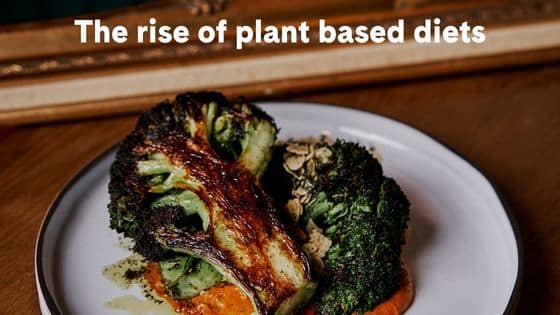The Rise of Plant Based Diets

Post pandemic, many companies and individuals are revaluating their immediate necessities and the actions/damage it’s causing to the planet we call home. Among diversity, inclusion, and transparency, sustainability and health seem to be at the forefront of everyone’s minds.
Working from home has transformed the way we structure our day, making more room to put ourselves first and in turn, the environment. As we have more time to exercise and spend time with our kids, we have more time and access to prepare healthy food.
A rise of plant-based diets has been predicted for a while now. In 2020, plant-based dairy and meat sales were recorded at over $29 billion (Food Revolution, 2022). The Coronavirus Pandemic assisted in accelerating this trend with researchers now expecting sales to grow to $162 billion by 2030.
Not only have plant-based diets proven to improve your health, but there’s also significant data highlighting its high potential for reducing carbon footprints and diminishing climate change.
First your health. Infusing your diet with plant-based meals boosts your immune system and reduces inflammation. Plant’s produce essential and core nutrients other foods lack. The nutrients such as vitamins and antioxidants counteract inflammatory toxins your body may have taken in such as pollution, processed food, preservatives, and viruses. Inflammatory toxins have been linked to cancer, arthritis and similar inflammatory diseases as well as cardiovascular diseases.
An additional benefit to increasing your plant-base intake is the source in fibre, as it makes up a plant’s structure. Fibre improves gut health allowing you to better absorb nutrients and process food. Additionally, fibre has proven to lower cholesterol and stabilize blood sugar (MD Anderson, 2019).
Overall, a plant base diet is great for your health – but how is it great for the environment?
Well, the Standford Report stated “reducing your meat and dairy consumption, even by a little, can have big impacts. If everyone in just the U.S. ate no meat or cheese just one day a week, it would have the same environmental impact as taking 7.6 million cars off the road” (Stand Report, 2021).
In fact, a plant-based diet creates 2.5 times less carbon emissions than a meat-based diet and the production of a chicken breast for purchase uses 735 litres of water (Veg Society, 2022).
Overall, studies found that “a shift to a plant-based diet could reduce mortality and greenhouse gases caused by food production by 10% and 70%, respectively, by 2050” (PCRM, 2022).
This year Ovolo launched their next step in their venture into ethical eating, conscious cuisine and cutting-edge veg introducing delicious food with a playful twist that’s exploding with rich aromas, vibrant colours and floods of flavour. All year round. All the time. At Ovolo, they believe in eating good – to feel good. That’s good for you – And good for the planet.
